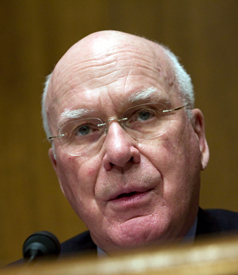When the Supreme Court reversed the “honest services” fraud statute on June 24 in Skilling v. United States, it ruled that the legislation could only apply to bribery and kickback schemes, leaving the Department of Justice (DOJ) partially incapable of prosecuting cases of public corruption and corporate fraud.
As the Skilling ruling launches a series of appeals and motions for dismissals of convictions brought under the statute, including a request for retrial for Jeff Skilling himself, DOJ Assistant Attorney General Lanny Breuer has asked Congress to help the department close the gap left by the Supreme Court. In a statement to the Senate Judiciary Committee, Breuer said, “A public official who conceals his financial interests and then takes official action to advance those interests engages in behavior every bit as corrupt as if he accepts a clear bribe from a third party. The department urges Congress to act quickly to restore the department’s ability to prosecute individuals for this kind of undisclosed self-dealing.”
Busy schedule? Click here to keep up with Truthout with free email updates.
On Tuesday, Congress acted quickly. Senate Judiciary Committee Chairman Patrick Leahy (D-Vermont) introduced the Honest Services Restoration Act, a bill that would cover the currently decriminalized acts of fraud, prohibiting public officials and corporate officers of publicly traded companies or charities from secretly receiving financial benefits at the expense of the public or their company.
“We cannot let corrupt or fraudulent conduct go unchecked,” Leahy said. “The Honest Services Restoration Act aims to restore the law to what it was before the [Skilling] decision, strengthening it to allow prosecutors to investigate and combat public corruption and corporate fraud.”
In making its ruling in June, the Supreme Court stated that the original honest services statute was “unconstitutionally vague,” as it did not require prosecutors to prove that a defendant made personal gains from their actions. Justice Ruth Bader Ginsburg wrote for the majority decision, “It has always been as plain as a pikestaff that bribery and kickbacks constitute honest-services fraud. But DOJ and other law experts have stated that the ruling decriminalizes an essential area of corruption law – without which, many individuals involved in the Enron scheme and other infamous fraud cases could not have been prosecuted.
During the September 28 judiciary hearing, Duke University law professor and former Assistant United States Attorney Samuel Buell outlined several examples of cases that might have been impossible to prosecute without the honest services statute.
“Suppose that a senior officer of a company uses a loan program, approved in general terms by the board of directors, to spend lavishly and abusively on real estate, art, and luxury goods for him and his family. I am thinking here of the former Tyco chief Dennis Kozlowski,” Buell stated. “Or suppose that the Chief Financial Officer of a large public company obtains general approval to head up a private investment partnership in order to engage in hedging transactions with the company – and then arranges those transactions to line his pockets immensely, often with undisclosed and mischaracterized payments. I am thinking, of course, of former Enron CEO Andrew Fastow.” Because these cases involved the same undisclosed self-dealings that the Supreme Court decriminalized in June, Buell said, “how are such serious cases to be prosecuted?”
Sen. Jeff Sessions (R-Alabama) expressed some doubt over the legislation, stating that its lack of definition borders on overreaching federal law. “This is a pretty broad phrase, would you not agree? That a public official can go to jail for undisclosed self-dealing?” Sessions said.
“It would be our obligation … to establish that [the local official] knew he had the obligation … and knowingly did not fulfill that obligation,” Breuer responded. “And in addition, we would have to show that that same official had the specific intent to defraud.”
As senators and witnesses on both sides of the aisle agreed that the law should be written with care and bipartisan support, Leahy added, “I would urge you in the department to work closely with both Republicans and Democrats in our effort to draft such legislation.”
Congress passed the original honest services statute in 1989 in response to a 1987 Supreme Court decision that limited prosecutors’ ability to investigate mail and wire fraud laws. Leahy’s Honest Services Restoration Act is co-sponsored by Sen. Sheldon Whitehouse (D-Rhode Island) and Sen. Ted Kaufman (D-Delaware).
Trump is silencing political dissent. We appeal for your support.
Progressive nonprofits are the latest target caught in Trump’s crosshairs. With the aim of eliminating political opposition, Trump and his sycophants are working to curb government funding, constrain private foundations, and even cut tax-exempt status from organizations he dislikes.
We’re concerned, because Truthout is not immune to such bad-faith attacks.
We can only resist Trump’s attacks by cultivating a strong base of support. The right-wing mediasphere is funded comfortably by billionaire owners and venture capitalist philanthropists. At Truthout, we have you.
Truthout has launched a fundraiser, and we must raise $31,000 in the next 4 days. Please take a meaningful action in the fight against authoritarianism: make a one-time or monthly donation to Truthout. If you have the means, please dig deep.
